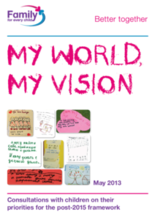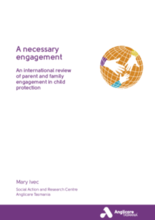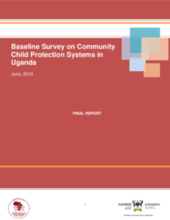Demographic Data
|
Sources: World Bank, UNDP, UNAIDS, DHS 2013 |
Displaying 12521 - 12530 of 14390
This article reports on the findings of research conducted by the TV Programme Panorama on some of the current practices and standards in the children’s residential care system in England, which were described by a charity representing children in care as “extremely worrying”.
Pays particulièrement marqués par la crise et la pauvreté, la Roumanie, la Moldavie et la Bulgarie bénéficient depuis quelques années d’un programme de coopération pour les droits de l’enfant, le PROCOPIL. Depuis 2005, il a enregistré des résultats encourageants.
On June 14, 2013, the General Assembly submitted a report in advance of its sixty-eighth session as a contribution to the High-level Meeting of the Assembly on the realization of the Millennium Development Goals and other internationally agreed development goals for persons with disabilities. The report reviews good practices and existing approaches to disability-inclusive development and concludes by recommending steps to include disability as an integral part of all development efforts, with a view to contributing to an action-oriented outcome document of the upcoming High-level Meeting.
This country care review includes the care related Concluding Observations adopted by the Committee on the Rights of Persons with Disabilities as part of its examination of Tunisia’s initial report adopted by the Committee at its fifth session.
This paper provides details of research into the gatekeeping system in Bulgaria for children under three and examples from recent Bulgarian and international practice. It suggests that gatekeeping could benefit from a social development orientation including activities to combat poverty and promote social inclusion through supporting community and family strengths.
This article describes the historical background and current situation of the child welfare system for children without parental care in Poland.
The Millennium Development Goals will come to an end in 2015 and discussions are currently taking place on what framework will replace them. Children’s participation is crucial to these discussions. Between July 2012 and March 2013, members of Family for Every Child consulted with children living in seven different countries. This report summarizes the main findings that emerged from these consultations.
This report provides a review of international and national models of engagement, support and advocacy for parents who have contact with child protection systems. How statutory child protection systems engage with parents ultimately affects the outcomes for children, including safety, permanency and wellbeing. While social work practices that emphasise people’s self-determination and strengths are recognised as fundamental to eliciting change in parents when care standards have faltered, there is widespread acknowledgment of the struggle child protection authorities have to meaningfully engage parents and families.
While many migrants and asylum-seeking children may try to reach Australia, they often spend months or years caught in Indonesia.
This report describes the process, findings and recommendations of the baseline survey for the project titled, “Building and Strengthening Community-Based Child Protection Systems in Busoga and Acholi sub-regions” commissioned by ANPPCAN. The baseline survey was intended to establish the status of project indicators so that the information obtained can inform the implementation of project activities.





